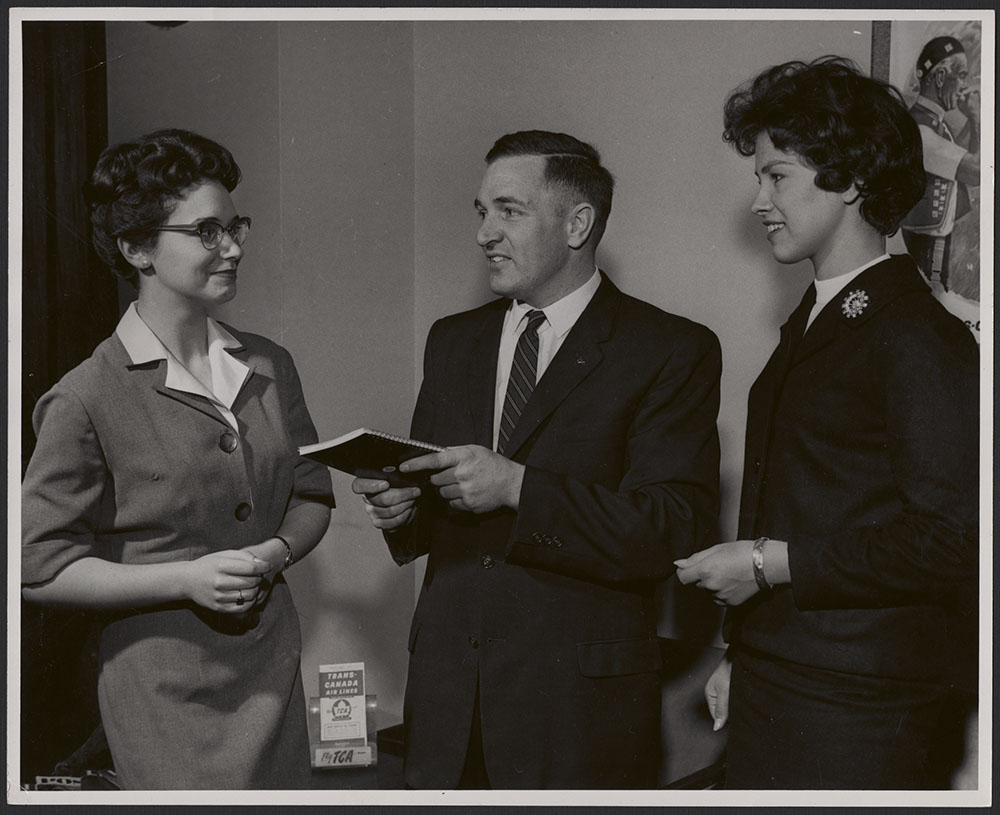This article contains historical language and content that some may consider offensive, for example, language used to refer to racial, ethnic and cultural groups. Please see our Historical language advisory for more information.
By Elizabeth Kawenaa Montour

The archival records of Charles Angus Cooke at Library and Archives Canada are invaluable for Kanienhkeha (Mohawk) language and culture revitalization. Cooke was born Thawennensere (Double Name) on Kanehsata:ke Territory (Oka, Quebec) in 1870. At age 11, he relocated to Wahta (Gibson, Ontario), and at age 23, he moved to Ottawa. These records of his important work are based on his knowledge of his ancestral language.

An original first edition of vol. 1, no 1 of Cooke’s newspaper Onkweonwe, dated October 25, 1900, is in Library and Archives Canada’s library collection. It is the only known surviving copy. The newspaper was groundbreaking because it was written entirely in the Kanienhkeha language and was the first to be produced in a First Nations language in Canada. Articles included current events, and topics such as foreign affairs, national affairs, the economy, sports, federal politics, hunting season dates, and the prices of produce and animals. The newspaper was a resource that could assist the economic endeavours of readers. It focused on and was distributed to communities in the region occupied by the Haudenosaunee (Iroquois) communities of the Six Nations all the way up to and including Wendake, a Huron-Wendat community in Loretteville, Quebec.

When Cooke left Kanehsata:ke in 1881, he spoke only Kanienhkeha, but learned English after his first year at Wahta. He was a teacher there before being employed as a clerk for the Georgian Bay Lumber Company. At the age of 23 in 1893, Cooke was hired as a library clerk for what was then known as the Department of Indian Affairs in Ottawa. His position included being an interpreter, doing translation and performing clerical duties such as document classification. He was one of the early, if not the first, public servants from a First Nation to be employed by the federal government.

Cooke pursued progressive ideas for projects that would benefit First Nations, only to have his attempts thwarted by uncooperative supervisors. One of these projects included a dedicated Indigenous-specific library, but it was never implemented. In addition to his Onkweonwe newspaper, he was able to complete a Comparative and Synoptical Indian Dictionary.

Additional language materials by Cooke are held in other institutions. An extensive compilation of Haudenosaunee names is held at the American Philosophical Society in Philadelphia, Pennsylvania. A copy of these records is kept at the Canadian Museum of History in Gatineau, Quebec, including a Kanienhkeha dictionary manuscript and other notes.
In 1913, Cooke assisted Marius Barbeau, an early ethnographer, in a grammatical study of Mohawk, Cayuga, Onondaga and Tuscarora languages. Barbeau would request his assistance again much later in Cooke’s life.
Cooke served as a recruiter during the First World War. He was seconded from the Department of Indian Affairs to help in enlisting what was to be a regiment composed entirely of First Nations soldiers, the 114th Battalion of the Canadian Expeditionary Force. He recruited in the Kanien’kehá:ka communities of Kanehsata:ke, Kahnawake and Akwesasne in Ontario and Quebec.
Cooke left the Department of Indian Affairs in 1926, having attained the position of Principal Clerk. He spent the next 12 years touring eastern Canada and the United States, reciting Haudenosaunee (Six Nations) and Huron-Wendat lore, songs and dances. In 1949 and 1951, he again assisted Barbeau as an interpreter at Six Nations of the Grand River in Ontario.
It is perhaps incomprehensible to the modern reader that, for all of his contributions and knowledge, Cooke worked in a political system that did not allow him to receive “Indian Status” under the Indian Act. As an adult, he made applications to register for First Nations Status, but these were never honoured. The applications would suggest that he was not registered as a child under the Indian Act. Cooke was born in 1870, six years before the Indian Act of 1876, so he may have not been registered during this time of upheaval for all Onkweonwe (First Nations peoples).
Between 1911 and 1926, Cooke sought recognition under the Indian Act as a member of the Dokis First Nation, based on his lineage from his Ojibwa grandfather, Showandai, who was a member of the Dokis Band. The Dokis Band refused Cooke’s claim. He was also never admitted into the Kanehsata:ke (Oka) Band or the Wahta (Gibson) Band.
Cooke’s life was an exceptional journey, from his ancestral roots to the intellectual and political front in Ottawa. He recruited his fellow Onkweonwe to join the armed forces for the First World War, was the cultural bridge for Barbeau’s research, and finally travelled and performed his Kanien’kehá:ka songs and dances throughout Canada and the United States. Cooke and his legacy are not forgotten by Onkweonwe today; he lives on through the important work he did, which is still accessible for the ongoing efforts of language and culture revitalization.
This blog is part of a series related to the Indigenous Documentary Heritage Initiatives. Learn how Library and Archives Canada (LAC) increases access to First Nations, Inuit and Métis Nation collections and supports communities in the preservation of Indigenous language recordings.
Elizabeth Kawenaa Montour is a project archivist in the Exhibitions and Online Content Division of the Public Services Branch at Library and Archives Canada.

![On the left of the graphic, Tatânga Mânî [Chief Walking Buffalo] [George McLean] in traditional regalia on horse. In the middle, Iggi and girl engaging in a “kunik”, a traditional greeting in Inuit culture. On the right, Maxime Marion, a Métis guide stands holding a rifle. In the background, there is a map of Upper and Lower Canada, and text from the Red River Settlement collection.](https://thediscoverblog.files.wordpress.com/2019/02/blog-banner.jpg)
![On the left of the graphic, Tatânga Mânî [Chief Walking Buffalo] [George McLean] in traditional regalia on horse. In the middle, Iggi and girl engaging in a “kunik”, a traditional greeting in Inuit culture. On the right, Maxime Marion, a Métis guide stands holding a rifle. In the background, there is a map of Upper and Lower Canada, and text from the Red River Settlement collection.](https://thediscoverblog.files.wordpress.com/2019/02/blog-banner-1.jpg)





